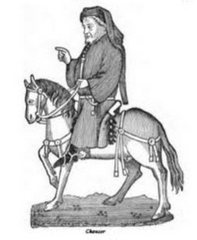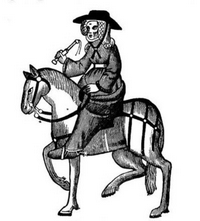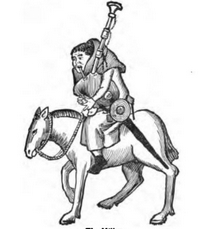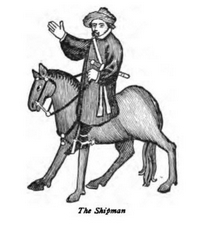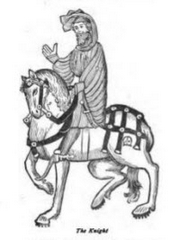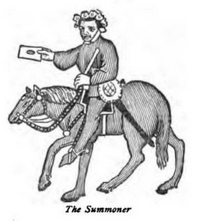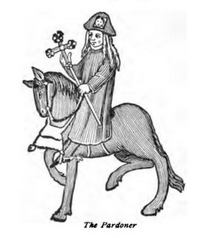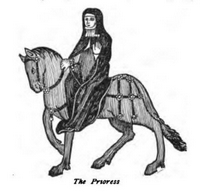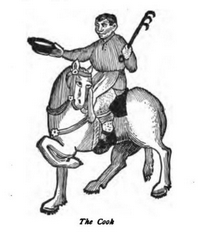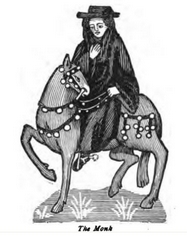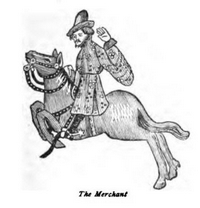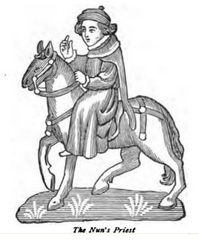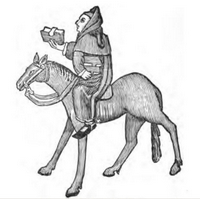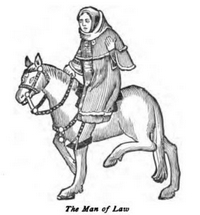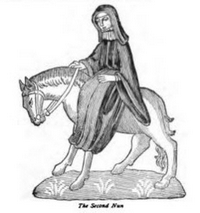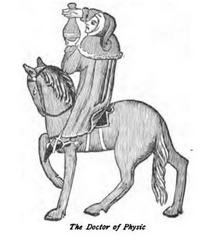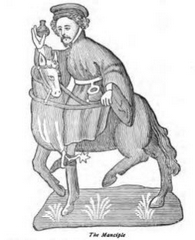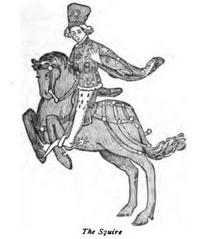The Summoner's Tale
|
This is a website about the Canterbury Tales
Here you will find a summary and information about the The Summoner's Tale |
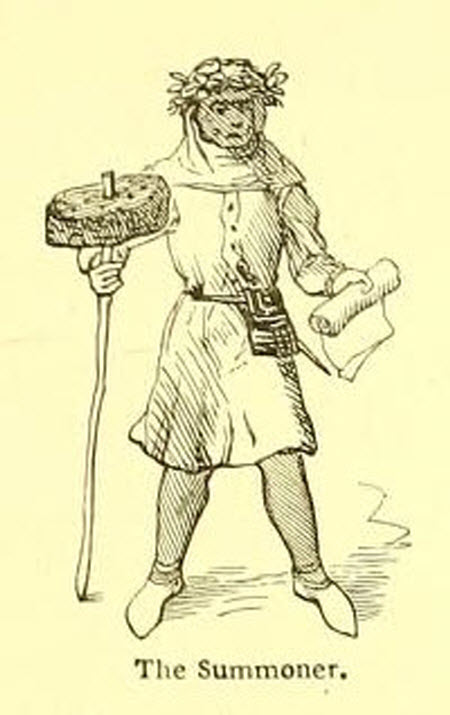
The Summoner's Tale The Summonerís Tale follows the Friarís Tale in the Canterbury tales. Unfortunately, the Friar paints a negative image of Summoners and thusly the Summonerís Tale reciprocates. Before the tale begins the two nearly fight but are calmed down by the group. The Summoner takes the negative aspects of the Friars and cast a satirical view on the concept of the Friar brotherhood. The Summonerís Tale, while short, illustrates an important part of medieval lifestyle. The Tale The Summonerís Tale focuses on a lowly friar who travels the country begging for alms. The friar makes his living by preaching and begging wherever he goes. The Summoner points out that the Friar records the names of those giving alms so he may pray for their safety and well being later on. He further describes the Friar as being dishonest and erasing the names from his board after he leaves the homes thusly showing the next house how nobody has given the Friar anything. The Summonerís Tale is interrupted by an irate Friar who angrily argues with the Summoner. Once the host calls for peace, the Summoner continues. After the introduction of the character, the Friar is seen visiting a sick man. After the squabble, the Summoner pushes his tale to further illustrate the depravity of the Friars. The friar does not beg for a paltry alms of food. He demands a roast boar head. He also pushes the sick man for money to build his order. The friar berates the poor man, demanding that he share wealth. He emphatically pursues how important his giving is. He also boasts how important he and the rest of his order are to the world. The sick man becomes irate and tells how he has already given to so many of the Friars over the years. He also points out that no matter how much he gives he never gets better. The Friar condescends the man and tells him warnings. After this argument the sick man concedes to giving the Friar brotherhood one final donation. He states that he is sitting on it for safekeeping. As the Friar greedily reaches under the manís butt, he farts tremendously. The Friar becomes outraged and storms out of the house without any alms. The Friar seeks out the local lord to tell him what happened. The lord laughs at the friar and refuses to punish the sick man. Instead the lord of the land ponders how to equally divide the gift among the thirteen members of the order. A discussion among the court occurs to determine how to best share the gift. The lordís squire approaches with an idea. He claims that the friars could stand in a circle on a still day with someone in the center. The person in the center could fart and the entire congregation could share it. With laughter, the lord is impressed with the squireís idea and rewards him with a new quote. The Summonerís Tale ends with the court laughing at the Friars' expense. The Interpretation While the Summonerís Tale is a direct smack in the face of the Friar who defames the Summoner, the tale is meant to generalize Friars. This stereotype is born from the concept that Friars take vows of poverty, but tend to live well. The satirical version of the Summonerís Tale is both used to portray the general view of friars, but comedic as well. This satire reflects the theme of corruption in the Church, which was a common belief during Chaucerís Time. The corruption of the church is a centralized theme in the Canterbury Tales. The Summonerís Tale differs from other tales that hint at clerical corruption. The Summonerís Tale directly accuses the church of being corrupt whereas the Pardoner portrays the corruption as an individualís choice. This tale really strikes home in the 14th century when they were written because most of the lower class citizenship truly distrusted the church. Aside from corruption, the Summonerís Tale gives a negative take on Summoners. The Friarís Tale defames Summoners. Instead of using his tale and turn to defend the name and status of Summoners, the Summonerís Tale is aimed at defaming Friars. This illustrates not only contention between the two, but Chaucer shows how this anger exists between the two classes in the medieval world. Chaucer uses several methods to illustrate the angst each feels. The fact they attack each other only serves to solidify this illustration. The point of the Summonerís Tale is to illustrate how corruption exists in the Friar order. However, it also shows a larger part of the human psyche. The want of a better life and to live well is a theme in the Summonerís Tale. He depicts the friar as always striving for more, even though his station in life demands poverty. This illustrates how every person hungers for more despite their position. This goes back to the ideas behind class that Chaucer focuses on throughout the Canterbury Tales. The concept of the sick man also shows a weakness in the church and the minds of men. The sick man argues that no matter how much he gives to the Friars, he is still sick. Chaucer shows the ailment of the body cannot be fixed by the church. The statement can be taken as another slight against the church as far as healing and spiritual healing go. The faith in the church was waivering during this time period, and the Canterbury tales illustrate this well. Overall, the Summonerís Tale is a satirical comedy that portrays a corrupt Friar living beyond his vows. While this is a blatant attack against the Friar, the Summoner also shows his own shortcomings. He illustrates the importance of a counterattack versus defense. Either way you interpret the Summonerís Tale it is a humorous tale that ends on a positive note. Canterbury Tale Summaries
Sponsors: |
|
